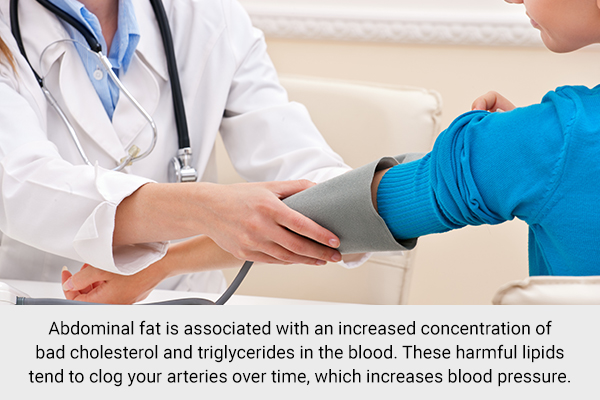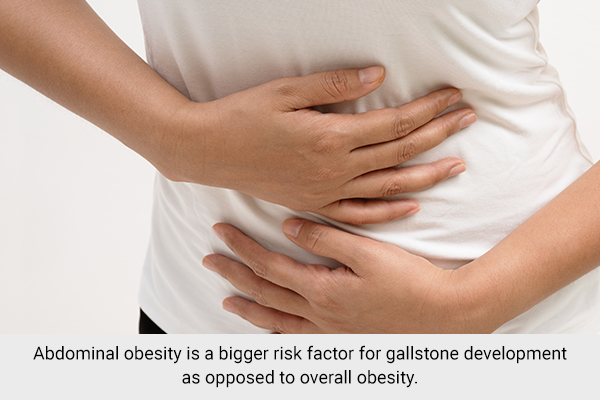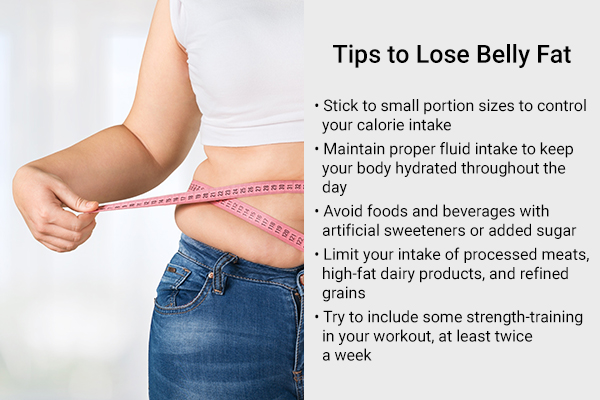In this article:
Abdominal or belly fat generally refers to the excess weight that builds up around the midsection of the body.

In medical terms, it is described as visceral fat, which collects around the abdominal organs deep inside the body. This kind of fat is considered far more dangerous than subcutaneous fat, which gets stored just under the skin.
Research suggests that visceral fat around the belly can put you at an increased risk of serious ailments even if your overall body mass index falls within the healthy range. (1) These ailments include cardiovascular disease, diabetes, stroke, hypertension, and even cancer. (2)(3)
Your waist circumference is a good indicator of whether you have too much belly fat or not.
Men with a waist circumference of more than 102.7 cm are likely suffering from abdominal obesity, and the same goes for women with a waist circumference of more than 89 cm. One study found these figures to be associated with an increased risk of all-cause death. (4)
What Are the Health Risks of Abdominal Obesity?
Too much visceral fat in the abdominal area can adversely affect your health in the following ways.
1. Increases risks of heart problems
Excess body fat is considered dangerous, especially if located in the abdominal cavity. Belly fat is known to significantly increase the risk of various metabolic complications such as:
- Insulin resistance, which increases your blood sugar levels
- High levels of LDL (“bad”) cholesterol and triglycerides
- Low levels of HDL (“good”) cholesterol (5)
This fat is stored in the form of visceral adipose tissue around vital organs in the abdominal area such as the liver. (6) Fat accumulation over the liver paves the way for nonalcoholic fatty liver disease, which further increases your cardiovascular risk.
All these factors can jeopardize your heart health to a great extent.
Several studies have shown that abdominal obesity can make you increasingly prone to cardiovascular disease, irrespective of your overall amount of body fat. (7)(8)
2. Increases risk of high blood pressure

As discussed earlier, abdominal fat is associated with an increased concentration of bad cholesterol and triglycerides in the blood. These harmful lipids can clog your arteries over time, which increases blood pressure.
According to a Chinese study published in the British medical journal Heart, too much fat around the abdomen can make you increasingly susceptible to high blood pressure, or hypertension. The researchers monitored the blood pressure, weight, and overall health of more than 10,000 Chinese adults over a 6-year period to see how changes in their waist circumference affected their blood pressure. (9)
It was found that men whose waist circumference expanded by at least 5% had an increased risk of developing hypertension by 34%, whereas women with the same increase in waist measurement became 28% more likely to develop high blood pressure than those with little change in belly fat.
Conversely, men whose waist size decreased by at least 2.5% had lowered chances of developing high blood pressure by 19%.
Yet another 2014 study published in the Journal of the American College of Cardiology showed that excess fat in the abdominal area increases the risk of high blood pressure, irrespective of overall weight or body mass index. (10)
This visceral fat collects around the kidneys, preventing them from working properly. Diminished kidney function, in turn, hampers the body’s ability to regulate blood pressure properly, resulting in hypertension.
3. Causes sleep apnea
Obstructive sleep apnea (OSA) is characterized by brief lapses in breathing during sleep caused by a repeated collapse of the upper airway.
A 2008 study published in Diabetes Care found that abdominal obesity and sleep apnea tend to worsen each other, thereby forming a vicious cycle.
This was further corroborated by a 2013 study published in the European Respiratory Journal, which examined the link between visceral fat and obstructive sleep apnea in men and women who were overweight but not obese. (11)
Research suggests that excess fat in the abdominal area puts pressure on the chest wall, thereby reducing lung capacity. The compressed lungs cannot receive adequate airflow, which makes the upper airway collapse more easily and frequently during sleep.
Conversely, sleep apnea increases your risk of developing more belly fat over time. You need good-quality uninterrupted sleep at night to wake up refreshed and energetic. But sleep apnea keeps you up at night and leaves you tired and drowsy the next day.
Daytime sleepiness and low energy levels make it difficult for you to stay physically active during waking hours. Thus, sleep apnea patients often resign themselves to an increasingly sedentary lifestyle, which paves the way for additional weight gain, often around the stomach.
Moreover, the sleep deprivation caused by this disorder can take a significant toll on your cardiovascular, metabolic, and pulmonary health.
4. Increases risks of cancer
Abdominal fat settles deep in the body, covering various vital organs, and increases the risk of various types of cancers if it persists for a long time. The fat may permeate inside the liver to cause fatty liver disease, which can turn into liver cirrhosis and even liver cancer in some cases.
Moreover, visceral fat is known to trigger inflammation inside the lining of the blood vessels, which can compromise your immune system. Weakened immunity makes it easier for cancer to develop inside the body.
Women with excess belly fat are more susceptible to breast cancer, ovarian cancer, and uterine cancer, whereas men are more likely to develop prostate cancer.
A 2013 study published in Cancer Prevention Research linked abdominal obesity with an increased risk of colon cancer in both sexes. (12)
Another 2017 study published in Oncogene found that fat cells in the body release a certain protein that can mutate a noncancerous cell into a cancerous one. (13)
5. Contributes to gallstone disease

Gallstone disease (GSD) is caused by a combination of different factors, and some older studies showed that obesity may also play a role in its onset, although research results regarding this are not consistent.
However, new evidence is emerging that indicates that abdominal obesity is a bigger risk factor in gallstone development as opposed to overall obesity. (14)
6. Leads to gastroesophageal reflux
The accumulation of excess fat around the abdomen exerts pressure on the stomach, which causes the sphincter between the stomach and esophagus to relax. The opening of this valve makes it easier for gastric fluids to flow back into the food pipe.
Plus, belly fat squeezes the stomach, which pushes stomach acid upward into the esophagus.
All these make you more prone to gastroesophageal reflux disease (GERD). (15)
7. Contributes to reproductive system disorders
There is a growing incidence of reproductive dysfunction in women with obesity, making it a pressing health concern the world over that warrants better treatment.
Studies show that female infertility caused by obesity is followed by an endocrinological influence. (16) Excess fat around the belly is especially linked with such reproductive issues.
Conversely, obese women who undergo moderate weight loss, especially around the abdomen, tend to notice an improvement in their menstrual regularity, ovulation, and fertility.
Thus, weight management should be promoted as the starting point for addressing infertility in obese women. (17)
8. Causes psychological problems
People with abdominal obesity and a high waist-hip ratio (WHR) are more prone to depression, while men with excess belly fat show increased rates of anxiety. (18)
9. Causes metabolic syndromes
People with excess abdominal fat run a high risk of developing metabolic disorders such as insulin resistance and dyslipidemias, which pave the way for diabetes mellitus and coronary artery disease. (19)
Tips to Lose Belly Fat
Try these measures to get rid of the stubborn visceral fat from the abdominal region:

- Do at least 150 minutes of moderate-intensity cardio or aerobics weekly. This includes any activity that speeds up your heart rate such as brisk walking, jogging, running, cycling, and swimming. All these exercises help burn excess fat at a rapid rate
- Include some strength training in your workout, at least twice a week.
- Go for exercises that work out your abdominal muscles, such as crunches, to tone that area.
- Consume a healthy, well-balanced diet that focuses on plant-based foods such as fruits, vegetables, whole grains, lean meats such as fish, and low-fat dairy items.
- Limit your intake of processed meats, high-fat dairy products, and refined grains.
- Stick to moderate amounts of monounsaturated and polyunsaturated fats in your diet.
- Stick to small portion sizes to control your calorie intake.
- Maintain proper fluid intake to keep your body hydrated throughout the day.
- Avoid foods and beverages with artificial sweeteners or added sugar.
When to See a Doctor
Seek medical consultation if you have excess belly fat along with the following health conditions or if these conditions run in your family:
- Diabetes
- Hypertension
- Breathing problems
- Abnormal cholesterol
Final Word
Too much fat in the body is considered a health hazard in general, more so if it builds up around the abdomen.
Belly fat settles deep between the abdominal organ, hampering their functioning and triggering various diseases over time. This also applies to people who may otherwise have a healthy weight and BMI but have a bulging belly.
There is no way to lose fat from any specific area of the body. You will have to exercise regularly and eat healthily to reduce excess fat from the entire body, including the abdomen. Getting rid of excess belly fat can save you from a whole range of health problems and thereby improve the quality and length of your life.
- Was this article helpful?
- YES, THANKS!NOT REALLY


